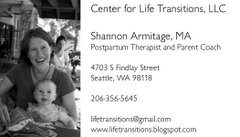In an attempt to clarify the seemingly binary categories of "orchid" and "dandelion" temperments, David Dobbs in a conversation with David Shenk (also of The Atlantic) says, "(I)t would be a rare person that was all orchid, so to speak, or all dandelion."
I agree. While the orchid-dandelion metaphor is useful in expressing different levels of sensitivity among children and adults, it fails to capture the wide range of in-between where dandelion-ness makes way for orchid-ness, and vice versa.
I recommend reading Dobbs' and Shenk's lively conversation here.
Monday, February 15, 2010
We're Neither All Orchid nor All Dandelions, so says Dobbs
Labels:
dandelions,
labeling,
orchids,
temperment
Subscribe to:
Post Comments (Atom)


2 comments:
I just read the latest issue of The Atlantic and was shocked to read a letter by therapist (!) Shannon Aarmitage describing her children as "one orchid, one dandelion." I can only hope her children are too young to read Mom's view of them.
I'm no scholar but I'll say this: any mother who would describe her children as one orchid and one dandelion in such a public way should look more to her child-rearing attitudes than to her genes.
Yes, I did read the article on which these comments are based. A mother's opinion of her child, especially when so freely expressed, can have a profound effect on that child and become a self-fulfilling prophecy. Watch your words, Mom.
Linda/RetiredTeacher
Mother of Two Prize-Winning Roses
Thanks for reading, Linda.
Actually, I don't see anything inherently good or bad in having "orchid" or "dandelion" tendencies. Indeed, I see strengths and challenges in both. And while I agree with you that labels can have a "profound effect", I think we all live by making meaning of our lives. Roses, orchids, and dandelions all lend color to our lived experiences.
Post a Comment